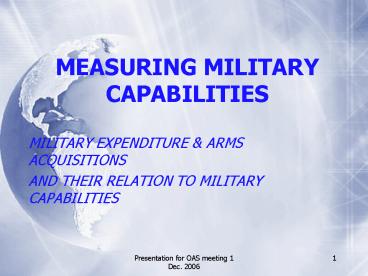MEASURING MILITARY CAPABILITIES - PowerPoint PPT Presentation
Title:
MEASURING MILITARY CAPABILITIES
Description:
Military capability is in the end only really measurable on the battlefield ... Bad - only traditional aggressive' weapons. Bad - voluntary ... – PowerPoint PPT presentation
Number of Views:60
Avg rating:3.0/5.0
Title: MEASURING MILITARY CAPABILITIES
1
MEASURING MILITARY CAPABILITIES
- MILITARY EXPENDITURE ARMS ACQUISITIONS
- AND THEIR RELATION TO MILITARY CAPABILITIES
2
Global Military Expenditure1996-2005 in constant
USD billions
3
OAS Military ExpenditureShares 2001-2005
4
OAS Military Expenditure1996-2005 in constant
USD billions
5
Global Arms Imports1996-2005 in SIPRI TIV
6
OAS Arms Imports1996-2005 in SIPRI TIV
7
OAS Arms ImportsShares 2001-2005
8
What is wrong with the previous pictures?
- They do NOT give good indications of military
capability - Bean Counting
- Military expenditure and arms acquisitions do NOT
make military capability - they are ONLY two of
many indicators - They are very weak indicators - certainly when
not disaggregated
9
How then to measure military capability?
- Military capability is in the end only really
measurable on the battlefield - Second (and preferred) option is using different
quantitative and qualitative data
10
What data are needed?
- Quantity
- What is there? Holdings existing inventory
acquisition modernization - deletion) - Quality
- How good is it? Technical parameters age
- How is it used? How good are the users?
- What logistic support is there? How long will the
platforms last? - What is the balance of equipment?
11
Equipment data needed
- Numbers
- Platforms
- Types (detailed)
- Age and modernizations
- Consumption goods
- Ammunition
- Spares
12
Context data needed
- Military context
- Basing
- Doctrine
- Training
- Network or integration of forces
- Policy context
- Defence and foreign policy
- Culture - national will to use military force
13
Where to get data?
- Numbers
- Registers (UNROCA, OAS - with as much detail as
possible) - Budgets (disaggregated)
- Background
- Policy statements (white papers) and policy
practice - Training and operation manuals
- Observation (exchanges)
- Joint exercises and operations
14
How relevant is measuring of military
capabilities?
- A must in areas of tension
- Of much less relevance for international
relations in peaceful environments - But relevant for internal use (measuring of own
military capabilities) - Synchronizing defence with foreign policy
15
Where does that leave UN MILEX mechanism?
- Good - disaggregated data
- Good - standardization
- Bad - voluntary
- Bad - very few report
- Never meant really to be used for measuring
military capabilities, recognizing threats and
early warning
16
Where does that leave UNROCA?
- Good - numbers and types
- Good - possibility for background info and data
- Bad - only imports
- Bad - only traditional aggressive weapons
- Bad - voluntary
- Bad - important importers do not report
17
Where does that leave OSCE exchange of
information?
- Good - mandatory
- Good - numbers and types
- Good - including some support/force multiplier
systems - Good - verification
- Good - reporting on planned acquisition
- Good - acquisitions and holdings
- Good - info on doctrine and policy
- But not in region in much need of it
18
Where does that leave OAS Convention?
- Good - mandatory
- Good - numbers and types
- Good - includes all acquisitions
- Bad - no holdings
- Bad - only traditional aggressive weapons
- Bad - no background info
- Bad? - very few report
- But not in a region in much need of it































